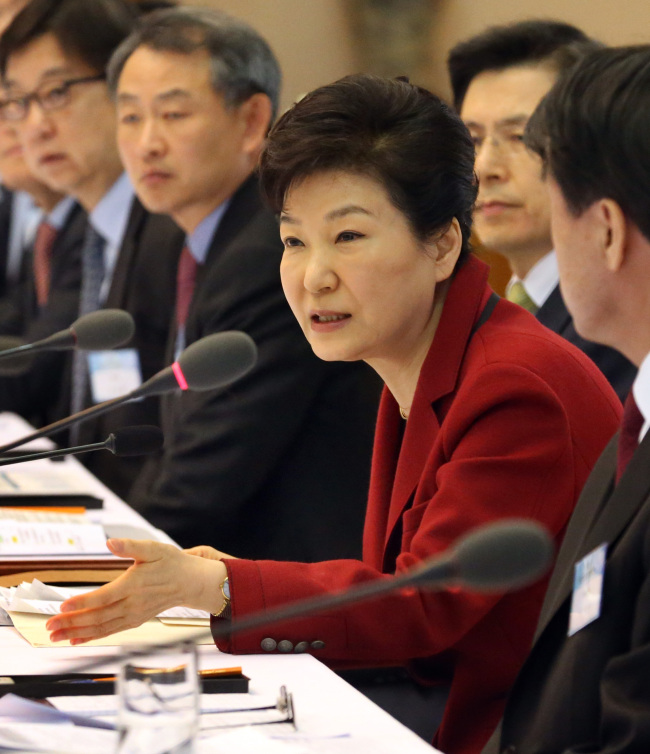If you believe the words of Cheong Wa Dae, the Park Geun-hye administration has achieved more than any previous government.
It celebrates its third anniversary in office on Thursday, but its generous self-evaluation is not without its detractors, especially when it comes to the nation’s financial soundness.
“Over the past three years, the Park Geun-hye administration has achieved more than any other government in the past,” the presidential office said in a policy brochure published on Tuesday.
“It has been willing to face criticism, if only to eliminate abnormal practices and to put the nation back on track.”
The booklet also advocated some of the administrations disputed actions, including the pending publication of state-controlled history textbooks, the deal with Japan on the compensation of wartime sex slavery victims and the recent closure of the inter-Korean industrial park in Gaeseong, North Korea.
 |
| President Park Geun-hye speaks during an economic meeting at Cheong Wa Dae on Wednesday. (Yonhap) |
Regarding the economic sector, the president remains optimistic.
“The global economic downturn and the recent military provocations from North Korea have posed challenges to our domestic market and national security,” Park said at a state seminar on Tuesday.
“It is especially in these difficult situations that we should place focus on revitalizing the economy and creating jobs for the people.”
But key economic indicators have been sending out warning signals during her time in office.
South Korea’s total household debt hit a record of 1,207 trillion won ($972 billion) as of the end of last year, up 11.2 percent from the previous year, the central Bank of Korea showed Thursday.
This obviously ran against Park’s election pledges back in 2012, when she had promised to “reduce household debt and revive ordinary people’s happiness.”
The administration has also seen a steady rise in state debts, which soared to 595 trillion won as of the end of last year compared to 425 trillion back in 2012.
This increased financial burden was mostly due to the extra budget allocation used in responding to the Sewol ferry sinking in 2014 and the outbreak of Middle East respiratory syndrome in 2015.
The labor sector has also performed below expectations.
One of the key policy slogans fielded by the Park government was to revamp the nation’s economic structure and to create jobs. It aimed to pull up the general employment rate to the 70 percent mark.
Amid a sluggish global economy and increasing external threats, the youth unemployment rate here peaked at 9.2 percent last year, according to the Ministry of Employment and Labor.
Cheong Wa Dae and the ruling Saenuri Party repeatedly claim that such circumstances are part of the reason why the pending labor reform bills should be approved. The opposition parties, however, say the government’s plan only focuses on boosting the number of jobs instead of improving the quality of the labor market.
One positive aspect was that global credit rating agency Moody’s adjusted South Korea’s sovereign credit rating from “Aa3” to “Aa2” last December — the highest-ever rate that the country has received from an international rating agency — giving credit to the government’s structural reform efforts.
By Bae Hyun-jung (tellme@heraldcorp.com)

